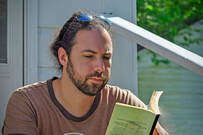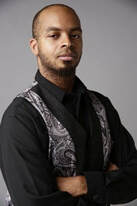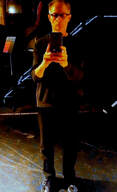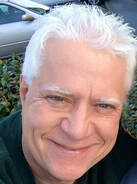 Robert S Dawson was raised in Badin, North Carolina. He received an MFA from Queens University of Charlotte and is currently an adjunct English professor at Rowan-Cabarrus Community College. His first book, The Plains of Moab: A Novel in Stories, of which this story is a part, is due out later this year. His stories have appeared in The MOON Magazine, Cowboy Jamboree, Page and Spine, The Missing Slate, and Junto Magazine. All Hail the Thief She was a nice girl, Josh thought, how could anyone so cute not be a nice girl? So he’d gone to her apartment after class to smoke some pot and, sitting on the floor of Carmen’s room and smoking a bowl, she started telling Josh about all the clothes she had.
Balancing the bowl, a blue piece with a green swirl, in her left hand, she leaned over and lifted the bed skirt to reveal her winter outfits, vacuum-sealed and packed into long, rectangular totes stacked two tall from the base of the headboard to the base of the footboard. She was wearing khaki shorts that stopped just above her knees and a green tee shirt that couldn’t hide her shapely figure, but didn’t flaunt it either. When she reached her arm out, the shirt lifted just enough to reveal her porcelain stomach. He wanted to touch it, kiss it. But she was very conservative compared to the other girls in college, giving Josh the notion that she was a modest girl. He had his eye out for a girl like that, a girl he could be with. He was tired of being alone, but he didn’t want to just settle; he wanted an honest girl, a good girl. And he was tired of just having sex with girls, there had to be more to it than that. Did he want to see all the new clothes she’d gotten, she asked with a smile, so excited that her hands chattered together like one of those mechanical wind-up monkeys with cymbals. She was on her way to get the clothes before he ever had a chance to answer. “Sure,” he said, already regretting it. One at a time, she pulled out four deep, paper bags bearing different logos from popular clothing stores, filled to their brims with clothes. Jeans, sweaters, tee shirts, panties, bras, all folded neatly and packed so that the maximum amount of clothing fit in each bag. On her knees in front of him, so that she was above him some as he sat Indian style smoking, she began unfolding each item. She held it up in the light, flipped it around so he could see the back, talking all the while about the clothes and other things that all blurred together. Josh sat smiling, looking at each object and saying, “Oh cool. Oh cool. Cool. Sexy...” but never really understanding or caring or knowing for sure what to say. “How could you afford all this stuff?” he asked, about half way through the second bag, having to break the monotony. Who knew there were so many kinds of panties? She smiled guiltily at the question. “You stole it?” he asked. He had suspected from the amount of stuff and the way it was packed, but he had hoped that her parents had bought the stuff for her or something. Glee carved the smile deeper into her face. “What else have you stolen?” Her eyes moved around the room. Josh looked around at the three big bookshelves she had. Every shelf had books, pictures, knick-knacks, or Rapunzel dolls on it. There was a flat screen television on the short shelf. “All of it?” he asked, unbelieving. “No, not all of it. Just some of it. My parents bought the TV and a lot of the books. And those up there,” she pointed to the top of the bookshelf and desk combination where some very old books sat collecting dust. “My pappy gave me those.” For a moment he was quiet, contemplating this mysterious girl he’d met at school. Her kinky brown hair seemed to burn red against the light of the lamp behind her, like embers hiding on a charred log, waiting to blaze up. “Have you read all these books?” “No,” she said. “Then why do you steal them?” “Because I want them.” “What about all those clothes. Are you really going to wear all of them?” “Probably not all of them. But I need those panties.” “But you didn’t need to steal all that shit. You could have gotten caught.” She wrinkled her nose. “No one’s going to catch me. I know how that place works. It’s so easy it’s impossible not to steal.” “Well, I don’t like it.” She had sat back down and started breaking another bud up in the grinder as he spoke, twisting the metal apparatus back and forth in her hand. “You shouldn’t steal.” “Why not?” “Because it’s one of the Ten Commandments.” “God’s not real,” she replied. “Well,” he said, after a long moment, not really knowing how to respond to that, “there are laws against stealing that are real. Very real.” “There are laws against smoking pot, too,” she said. “Yet here you are, smoking pot in my apartment.” Another even longer moment. “Well,” he finally said, sure of his answer, “I don’t like it when people steal from me, so I, therefore, make the statement that stealing is bad.” She laughed. “But I’m not stealing from a person, I’m stealing from a corporation.” “But that corporation is owned by a person,” he said, without hesitation. “It’s a corporation,” she said, as if it were a monster from another planet about to swallow the world whole. “It’s owned by many people. They make cheap ass shit and sell if for a fortune.” She held up one of the sweaters. “Do you know how much this cost to make? Like, seventy-five cents. Some poor woman in China works to the bone to make it for pennies. And they charge a hundred and twenty dollars! Who’s the real thief, huh?” # She worked for one of the retail stores in the mall, which is why she knew so much about security in all the different stores. In particular, she liked her own store because she could pack up bags full to the brim with whatever she wanted, place the bag in a fitting room, then assign that fitting room to whatever friend she’d gotten to come in and “pick-up” that day. All the workers and security see them as just another customer with various bags that they’d already purchased in other stores throughout the mall. Typically, payment was a bag of their own, into which they would pack whatever they’d picked out and brought in to the dressing room to “try on.” She explained it all to him on her lunch break as they sat in her car and smoked a bowl. “I don’t know about this, Carmen.” “There’s really nothing to worry about. The trick is to use bags from a different store so they think you just have things you already paid for somewhere else.” “I don’t believe in stealing.” “I told you, they’re the bigger thief.” “I still don’t feel right about it.” She leaned over and kissed him. When she leaned back she had a hunger in her eyes that he thought was for him. “You do this and I promise it’ll be worth your while.” He wanted to pull her in for another kiss but she pulled back. “No. Nothing else till after.” “Okay,” he capitulated. After she went in from break, he was to wait ten minutes then wander into the store as if he were just a normal customer. He wanted to smoke but she wouldn’t kiss him if he smelled like cigarettes, and most certainly wouldn’t have sex with him if he did, so he went in the mall and got a pretzel and Coke. Junk food was the only thing that seemed to curb the craving, but then he wanted a smoke after he ate, so he ate more and thought about the fact that, if he got through this, he would be getting laid. It had been months since he’d last had sex, but it made him feel better about Carmen that she wouldn’t. She may be a thief, but she wasn’t a slut at least. He didn’t keep track of the time, just ate at his own pace then wandered over and began gazing around at the clothes. Most of the clothes were overpriced and looked as if they would fall apart after one hard day’s work. As he stood there looking at the clothes, trying not to look around for Carmen, someone stepped up next to him. His heart pounded with fear that it was a manager or security already on to him. “Hi,” came the sweet, bass-less sound of Carmen’s voice. “Don’t act like you know me,” she whispered. Then in a louder voice, “How are you today, sir? Finding everything you need?” She didn’t allow him time to answer. “Only take clothes from the tables and racks in the back.” In a louder voice she said, “Over here, sir.” As they walked she whispered, “You have to pick out something,” as she looked around to make sure no one saw them talking. “You have to be trying something on to get a fitting room. These clothes back here don’t have security tags on them. I’ll signal you when I’m ready. Hurry up.” She spoke quickly and didn’t wait for a response. In a louder voice, “Well you have a good day, sir. Let me know if I can help you find anything else,” and she moved on about her way as if he were just another customer asking stupid questions. The racks of clothes she had led him to had a sign above them that read CLEARANCE and the tables had little signs on stands that were marked SALE. He found some tee shirts and some jeans on the table and then paced the racks, waiting for the signal. When it came it wasn’t what he thought it would be. He expected some secret sound or hand gesture, like they do in espionage movies, but she simply motioned with one move of her head, like they were friends in a normal every day situation. It was so simple, yet it sent a chilling shiver down his spine. “Hello,” he said, walking up with the four items folded over his arm. “Hello,” she said, smiling. “Need a fitting room, sir? Follow me. How many items do you have?” Then she whispered, “Four things? That’s it?” He shrugged. She smiled and shook her head at his floundering morality. They went down the narrow passage of doors for what seemed like forever before they came to the dressing room. Most of the time he watched her ass when he walked behind her but, in that hellish hallway, he felt like someone was going to jump out and catch them at any moment. He couldn’t focus on anything, just gazed around at the closed doors waiting for security to pop out of one. They stopped at a door that she opened for him. In the door was a mirror, distorted to make customers look thinner, and he frowned at the image of himself, still pudgy despite the illusion. Two bags sat on the bench below the beguiling mirror. “Okay,” she said, snickering. “Make sure it all fits first.” The door clicked closed. Shut up inside, he began to feel as though this were a trap and the walls were closing in around him. A stifling box he couldn’t escape from. Failing miserably to avoid looking into the mirror at his slimmer image, he could still see the chubbiness sticking out at his waistline, and the distortion did nothing to improve the chaos of brown curls on his head. He tried on the clothes, trying not to go quickly. She had told him to relax and be calm, “Just do everything like normal.” But how does one who never really feels normal act normal? He breathed and just tried to take a long time doing what he was doing, because that’s typically what normal people seemed to do. If he were acting as he normally did, he’d have already been out the door, but he wasn’t supposed to be normal Josh, he was supposed to be a normal person. So he took his time, which still wasn’t very long. Then he packed what little he had in the half full bag, trying to be soundless -- --knock, knock, knock-- Holy shit, he thought, what the fuck do I do now? “You ready?” a whisper asked. It was her. “Yeah,” he whispered back. “Okay, come out in like fifteen seconds.” He took a deep breath and started to count in his head. Fifteen seconds seemed like an eternity. At eight he started rushing through the count and didn’t even make it to fifteen before he was out the door, taking deep breathes like a man who’d been under water a long time, and headed down the hall of doors. Remember to breathe, he told himself. Carmen’s head was down but she looked up just as he approached and her eyes caught on him as if he were the most desirable thing she’d ever seen and, for all his doubts, that gave him some courage. Walking across the sales floor was the most terrifying and exciting thing he’d ever done since he lost his virginity, something comparable to riding a roller coaster, but he was moving on his own two feet. A manager with a headset on walked right at him, even made contact with her piercing eyes. “Find everything you’re looking for?” she asked with what looked like an accusatory smile, her eyes darting down to the bags then back up at his eyes. “Fine, thank you,” he said, trying to walk on steadily. Doing his damnedest to look normal. His mind raced. Was any of what Carmen told me really true? Were the managers really not allowed to chase you? My clothes had no security tags on them, but did any of the clothes she packed? Was she really in love with me? The manager kept looking at him confused. What had he said? “Yes, I did,” he blurted. Turning away, he sped up his walk, feeling like she was walking right behind him, so close he could feel her exhale against his neck. It wasn’t until he had made it to section nine of the mall that he dared look back. There were people everywhere, but he didn’t see the manager anywhere. Two security guards stood on Segways, talking and laughing, next to the Cinnabon. They paid no attention as he passed by to the exit doors. When he got to the car his heart was pounding with excitement, fingers tingling, and legs wobbling like jelly. It felt like he was about to collapse right there in the parking lot. Even though he didn’t want her stealing, there was still a level of excitement that came with being part of the act. They were both still buzzing from it when they got back to the apartment and it only increased when he kissed her in the doorway to her bedroom. They wrestled, tearing off each other’s clothes. The stolen items spilled out on the floor, already forgotten. # She was smooth. One hand worked as usual, holding things and inspecting things and basically drawing the attention of anyone watching, while the other hand went to work sliding things into her canvas bag. They had split up because he wanted to look through the discounted Blu-ray’s, but he caught a glimpse or two of her moving about on the next aisle. “I want you to quit stealing,” he said, as they met up again at the end of the aisle and headed for the door. “Why?” “Because it’s wrong. You could get caught or in trouble,” he said. “And stealing is the same as lying and I can’t be with a liar. I mean, would you lie to me?” “No. I could never do that,” she said, her eyes round and trembling. “And I would never steal from you either. But it’s not the same thing. You can lie about stealing, but stealing isn’t lying, it’s just borrowing without asking, and when you’re asked and you don’t give it back, then it’s stealing. But, I could never lie or steal from you.” “Oh no? What about that pot you stole from me when we first started hanging out?” “That was different. It was just pot. It’s not like I don’t smoke with you.” “True, but I smoke with you. I’ve never taken any from you and smoked it with someone else.” “Okay. I’m sorry I stole that pot from you. It was just like a gram though.” “It was all I had.” “Well, I’m sorry.” “It’s okay.” He was sure that she wasn’t lying. She loved him and that meant she couldn’t do to him what she did to other people. He decided to finally use the one thing he had to use against her, even though he really didn’t want to. “What if I quit smoking cigarettes if you quit stealing?” “Okay,” she agreed, almost without any hesitation, like she knew he was going to ask that. Her eyes lit up and she started getting excited, like when she first started showing him all the clothes she’d stolen. “But I’m not putting any of this stuff back.” “Okay. And I’m going to finish this pack of cigarettes.” She smiled and took his arm as they walked out of the store with the stolen goods. He had it all figured out. This was it. This is what people were supposed to do. Find someone you could compromise with and who had similar beliefs as you, then you were set. Later that night, he kissed her and started to take her clothes off when she stopped him. “Tie me up,” she said. “Tie you up?” “Yeah. I like it rough and kinky. You’re too soft.” “That’s because I’m making love to you. That’s what people are supposed to do when they’re in love. I’m not fucking you. There’s a difference.” “I like it kinky.” “Okay,” he agreed. “But tomorrow, can we do it my way?” “Maybe.” # He made it six months without smoking a cigarette and, as far as he knew, she hadn’t stolen anything. One morning when they were lying in bed, she asked him if he ever thought about them living together and getting married. They were wrapped together in warm blankets with the smell of lilies and incense all around them. “Would you marry me?” He laughed. “Why are you laughing? Answer the question.” “Yeah,” he said. “I guess I thought about it, but I’ve never met someone who’d even be willing to marry me. I thought I did once, but it didn’t work out.” “I’d marry you,” she said. “You’re the perfect guy. You have this kind of protector quality, but you listen very well. If a girl is out to get married, she’d be a fool not to pick you.” He laughed again at the ludicrousness of her statement. “What makes you say that?” “I don’t know,” she said, laughing. “You’re just...you. You’re a man, and stubborn, but you’re less stubborn than most I’ve met. I’ve dated older men than you, but I don’t know, there’s just something different about you. You’re...a nice guy. A good man.” “Really?” he asked, not impressed with her flattery. In comparison with some of the men he’d known, he still felt much like a boy. She sat up and stared down at him as if she suddenly realized something that she liked and hated at the same time. “You remind me of my father.” “Oh boy. So, the moment you saw me you knew you wanted to marry me?” “Well. No,” she said looking away. “I don’t believe in all that kind of stuff.” “What kind of stuff? Love at first sight?” “Love in general, I guess.” “You don’t believe in love?” “No.” “So, you don’t love me?” She looked into his eyes with the most sincere expression. “I do love you.” “But you just said you don’t believe in love.” He grinned. “I don’t believe what they say about love. About it just happening to you. Love is a choice. You choose who you love and you choose whether to fall in or out of love with them.” “So, if you choose to marry me, then that’s it? It’s forever? Because when I get married that’s it for me. There will be no divorce.” “Oh no,” she said. “Me either.” “But that’s a long time from now, right?” he said. “Why? Do you have a problem marrying me?” He shrugged. “No. It’s just not something you rush into.” “More insight from the great guru,” she laughed. “What’s that supposed to mean?” “Nothing.” “It means something.” “It’s just a joke. Relax. You’re always so serious about these things.” “Because these things are important.” “You’re always contradicting yourself.” “So are you.” “Because there are no right answers, Josh.” # By the end of the year they were living together in an apartment near enough to campus they could ride their bikes or walk to class. Life seemed good. His grades were excellent despite having to take on extra shifts to pay the bills. When he started to feel as though he was stretching himself too thin, he’d look at her beautiful face and breathe a sigh of relief. But she did not find his presence as gratifying as he found hers. She’d begun to doubt her decision for a major in school, it didn’t cross his mind at the time that she might be having other doubts too. “It’s okay to be unsure of what you want to do,” he told her, trying to calm her from one of her panics about life. “Just keep working at it. You’ll find yourself.” “But I feel like I’m holding you back,” she said. He’d heard that line before. Why did girls always feel like such a burden? He stood up from the couch and walked over to where she stood with her arms crossed by the electric fireplace. She turned when he tried to kiss her. “Look at me,” he said. “You are not a burden to me. You will never be a burden to me. You are not holding me back. I’m doing great in school. What’s the problem?” “You said you’re going to have to postpone grad school and I don’t want you to have to do that.” “I chose this life with you,” he said, “fully knowing the consequences. There is nothing wrong. I’ll get a real job after college and work until we can afford grad school for me. It’s no big deal. Experience will be key in landing a real job anyway.” “But what if you can’t get a job after your bachelors? What if you wind up waiting tables the rest of your life? I know how much you hate it.” “Don’t worry,” he said, putting his hand on her cheek, “it’s going to be fine. Waiting tables isn’t that bad. Besides, once I get my screenplay finished, we’ll be rolling in money.” “Oh, Josh. That’s a pipe dream. When are you going to give that up?” “You sound like my mother.” She jerked and her lower lip started to quiver. “Oh no,” he said, almost laughing because of how beautiful she was when she cried. “Please don’t cry. I love you. Please don’t cry.” But she only cried harder. He kissed her and held her. After she calmed down he started to slide his hand up under her shirt to unsnap her bra. “No, no, no,” she said, pulling away. “I haven’t showered. I’m dirty.” “So,” he said. “I’ll eat your pussy after you run a marathon. Come here.” “No,” she said, going to the sink to wash the dishes that had slowly been escalating from a small pile to a mound. “Come on,” he pleaded, walking up behind her and pressing himself up against her. “It’s been like two weeks.” “No. It’s gross. After I take a shower.” She turned on the water and rinsed the sponge. “Okay, well, I’ll be working on some homework,” he said, knowing that, after her shower, he’d try again and fail. It was as if, once they actually lived together, she was done with him or was at least done trying to please him. She had him where she wanted him. “There is no more need for that foolishness,” she seemed to say with the flip of her hair and that blank expression. He hoped he was wrong and kept trying. Promised himself to do his best, promised her and hoped she’d do the same. She persisted that she would do her best and that she loved him dearly with those big, doughy, lying eyes and her trembling lips. But he could not help suspecting that something was wrong. “Why don’t you do some damn dishes every once in a while?” he heard her say just loud enough to travel around the corner. He stepped out of the extra room that they’d converted to a library-office for his schoolwork and sparse screenwriting, filled mostly with stolen books, and glared at her for a moment before answering. “I was the last to do the dishes, remember? And I almost always cook. The cook shouldn’t have to wash the dishes.” “I can count on one hand how many times you’ve washed dishes since we’ve been here.” “But how many times have I cooked?” “You make the mess, you clean it up.” “You eat the food, you contribute.” She cut her eyes at him and he knew she was thinking about throwing the plate she was washing at his head, so he jumped back into the library-office and slammed the door shut. When he heard her leave the kitchen and turn on the shower, he paced the apartment, too frustrated to think about anything but his nonexistent love life. What the hell has happened to me? To us? I was better off alone. He heard the shower shut off and was pulled out of his thoughts. His eyes were on a shelf in the nook they had designated as her office. On the shelf sat a family of clay mushrooms painted in vibrant, trippy colors. Those had certainly not come from her Right Wing parents, nor had she bought them with his money because she always gloated and flashed everything off that she bought with his money. She walked around in her towel for a while and the mushrooms slipped from his mind. He snuck up behind her and followed her back into the bathroom. He started kissing her neck and undoing the towel, letting it fall. She caught it in the air, pressed it tight to her chest, and grabbed his hand before he could get a good grip on her half-exposed breast. “No.” “But you said...” “I’m really just not attracted to you anymore. I never really was.” “What the hell? Really?” “Well, yeah. You’re...fat.” It’s true, he had gained weight since he quit smoking cigarettes; about twenty pounds. He only weighed 195 pounds though. Not as skinny as he was when he met her, but not as fat as most Americans. “But don’t you still love me?” “Yeah,” she said, like a child answering a parent in a certain way because the child knows that’s what the parent wants to hear. “But you’re not going to have sex with me?” “I’m just not in the mood ever. Maybe if you weren’t so heavy.” “If you wouldn’t have made me quit smoking--” “Don’t blame that on me. Eat healthier. Stop going to McDonalds on your lunch break.” “--and not even quit stealing!” he shouted over her. “What?” She suddenly changed from enraged shouting and arm flailing to perfect composure. “I haven’t stolen anything.” “What about those mushrooms in there with your poetry books? Where the hell did those come from?” “Jen gave me those. What the hell?” “Fine, if you say so,” he said. “I’ll lose weight, I promise, but can’t we have sex now? Like a down payment?” “No.” “Well screw this. I’ll just find some other girl to have sex with.” “Good luck with that. You’ll never find a girl hotter than me that actually will.” “Oh, I’ve had plenty of hotter girls than you.” “Oh, yeah? Who?” “Sylvia. Jessie. Jo. Michelle. Alice--” “Bullshit any of the girls you had before were hotter than me. Let me see some pictures.” “I don’t have any pictures.” “That’s because you’re lying. You think you can find a hotter girl than me that will actually be with you, fine. Go.” She slammed the door behind her when she went into the bedroom. Maybe she’s right, he thought. Those other girls had all left him in the end, but Carmen was still here, and she was hot. He’d catch other girls looking at him in class, they’d give that little smile and he’d think, “I could have her, but I’ve got Carmen.” They were all beautiful girls, but Carmen was beautiful. “I’ve got what I need, no need to screw it up.” Sometimes he would wonder if one of those girls was more suited for him, like the brunette with the crooked nose or the blonde with the bushy eyebrows, but then he’d shrug it off as just a test to try and bring him back to his old ways. He had something good with Carmen. She was with him. He slapped his belly, watched it shake in the bathroom mirror and resolved to lose weight. He was going to get as buff as he could. Sex was something he just couldn’t live without. # The walking and biking to class must have already had some effect on him because he suddenly began to lose weight, as if setting his mind on the goal simply made it happen. Carmen had been hanging out with her friend Jen a lot and often got in late, but he intended to show off his new body when she got home one night, so he waited up for her. He tried his hardest to stay awake, but it was nearly three-thirty, what was taking her so long? The front door woke him up, drool running down his cheek and sunlight coming in through the windows. “Hey,” he said, his voice rough. She looked at him as if he were a stranger or a ghost. “Sorry. I fell asleep on the couch and Jen didn’t want to wake me.” “Really?” She wouldn’t look into his eyes and he knew then that something had happened. She was not going to her friend Jen’s, or her and Jen were more than just friends or something, but he knew things were off. He just couldn’t prove it and Carmen never faltered once. Lies poured from her like water from a river’s source. “Jen and her boyfriend are having problems, so I was being supportive. I’m so glad we don’t have those kinds of problems.” Or, “Jen’s dog got ran over so she needed a friend.” He states that she doesn’t have a dog, thinking he’s got her, but she quickly answers, “Her childhood dog. It’s at her parents’ house.” He had no idea how to tell the truth from the lies, but he knew that she was lying, despite that look in her eyes. She was never so calm when she was telling the truth. He was so mad he wanted to leave right then and never look back, but, when he looked at her beautiful little face, he didn’t want to leave. What if he was wrong? What if she was right and he really was just being paranoid? # A girl that looked familiar walked up to him at the coffee shop on campus a few days later. She had light brown hair and was about the same size as Carmen. He thought she was remarkably attractive but, before he could really make a full thought about what was happening, she walked up to him and gave him a big, fake smile. “Hey, Josh,” there were tears welling in her sky-blue eyes and he realized it was Carmen’s friend Jen, he’d only met her a few times and barely recognized her. “I’m sorry I can’t talk long.” Her voice was cracking. “Carmen and Dean have been fucking behind our backs. I’m sorry to be the one to tell you, but I thought you should know.” Dean? he thought. Who the hell is Dean? But then it came to him, Dean was the boyfriend Jen had had “problems” with. A flame of anger rose in him and he literally felt his skin get hotter. There was nothing he could do about it though. He ran across campus to the Circle K and bought a pack of cigarettes. As he walked back to campus, he called his brother, Carl. After school, he went straight home and started packing his stuff. He did it completely silent, as she stood over him explaining herself. “Are you not going to say anything?” she asked. Silence. He had cancelled the bank accounts to make sure she couldn’t rip him off any more than she already had. When Carl showed up at the door she quit explaining herself, just stood glaring at them with red eyes and her arms crossed. When they had everything packed up and climbed into his truck, Carl shook his head and said, “That sucks brother. It’ll probably turn out for the best though.” “Yeah.” “You just gotta move on. Look at the bright side. At least you weren’t married. Divorces are expensive. Just take some time at my house to get yourself back on your feet and you’ll be able alright. Maybe get laid or something. Clear your head.” “Yeah,” Josh said, looking down defeated. When he had called the bank, he found out that his accounts were nearly dry already and the credit card just shy of being maxed out. He didn’t know how he would be able to get back on his feet from that, the only thing he knew was that he needed to get through the semester. One day, Josh ran into her on campus as she was walking sexily across the quad. Her hips swaying like a model, but she was still wearing those deceptively modest clothes. Just seeing her made him feel tingly all over. “Hi,” she said, stopping in front of him. “Hey,” he said. He wanted to take her right there. Rip her clothes off, slap her around and hold her down while the entire school watched him claim what was his. But he resisted. She would have enjoyed it too much. “Want to get some lunch? There’s that Indian place across the street we never tried.” It was the first time that he had really looked at her since he found out. He turned his head, not daring to look directly at her, as if she were Medusa, her evil power already starting to seep into his heart from that simple glance. “No thanks,” he said. “I gotta go.” “Okay.” She smiled weakly. Quickly, he turned and started walking before that creeping desire to go with her took over him completely. “See you later,” she shouted at his back. He threw his hand up but didn’t turn around until he’d walked a good distance. When he did, he could still see her walking away. Her ass was still as perfect as ever. He did wish he had it back. He wanted to bury his face in it. He went home and took a cold shower, but he couldn’t shake the thought of her, so he just went with the thoughts and relieved himself into the drain. When he got out he toasted her with a bottle of Carl’s whiskey. To that fucking whore. All hail the thief.
0 Comments
 Mitchell Ellis is a graduate of Full Sail University and US Navy veteran. He graduated Full Sail with a bachelors in Entertainment Business in August 2018. He vividly volunteers his time working at Megacon Orlando and professional wrestling events, and enjoys karaoke. He is currently working on a screenplay and further continuing his career as a writer. You can follow Mitchell Ellis on Twitter at @Duaneinc5Ellis or email: [email protected]. Blades Dance Under Moonlight |
Categories
All
|







 RSS Feed
RSS Feed